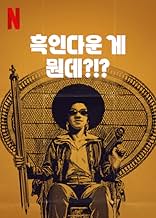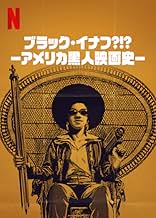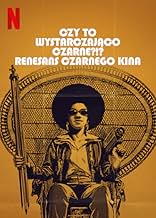El historiador y crítico cultural Elvis Mitchell analiza el cine afroamericano desde sus orígenes hasta la revolución de las influyentes películas de los años 70.El historiador y crítico cultural Elvis Mitchell analiza el cine afroamericano desde sus orígenes hasta la revolución de las influyentes películas de los años 70.El historiador y crítico cultural Elvis Mitchell analiza el cine afroamericano desde sus orígenes hasta la revolución de las influyentes películas de los años 70.
- Dirección
- Guión
- Reparto principal
- Premios
- 4 nominaciones en total
- Self
- (as Louise Archambault Greaves)
- Self
- (as Jim Signorelli)
Reseñas destacadas
The bad: but after an hour this documentary veers of into all sorts of directions, becoming disjointed and long in the tooth.
It is as if this director simply had no control over his urge to namedrop as many film classics as possible and then start analysing what was wrong with them.
Recommended watch for the first hour, but I fear not many will stay focussed till the very end, because this documentary unfortunately peters out after the first hour.
Unfortunately, there are two major problems with this documentary. First is it skips over a lot. If not completely skipping it only skims the surface of those films, performers and filmmakers. Some of which it can be argued are more important that a lot that was included. Often they opted to cover & present as more influential fairly obscure films (never even released on DVD) rather than more successful films. Still what it did cover was entertaining.
Second, it made it sound like much of black cinema especially the 1960's to 1980's was only for black film goers. Some of these movies were successful because they also reached a white or other audience. Movies like Shaft, Coffey & others they mentioned were simply excellent movies with excellent performances, period. Funny they kind of mention that Motown music was only for black audience. Ridiculous. Even the Beatles recorded a couple of Motown songs.
I will rate this 7 out of 10, mainly for being entertaining. Plus I did learn about some films I've never heard of.
One of the more unexpected aspects is it's inclusion of experimental films, from animation to split screen. There is minimal focus on this but it does highlight ambitious storytelling and filmmakers responses to a restrictive system.
Lady Sings The Blues- I was young when my mom took me to see this in the theater. I was 8, but I was told this was an important movie of an historical figure that needed to be implanted into my young mind. I honestly don't recall the makeup of the audience but I do remember the seats being packed, and being angry at the end. My mother explained to me how important Billie was to music today, and how awful humanity can be to one another.
That's a pretty heavy message to lay on an 8-year olds head, but the message was not lost on me. My point is, not every white person was avoiding important black films and during the 70s, racism was being addressed and a lot of white people were horrified. Growing up in and around Madison, WI, there were quite a few black children in my class, and it honestly never occurred to me that they were anything other than classmates, and some were my friends.
As I grew, things like Roots, Blazing Saddles, Mahogany, Car Wash and stealing listens to my dad's Pryor and Red Foxx albums dot my youth and it wasn't ever presented as anything other than entertainment- my parents weren't 'white knighting' for black culture,!there was just pop culture and skin color had nothing to do with it.
Now, make no mistake, I'm certainly not saying there was no racism, no ignorance, stupidity, but not everyone was a racist hilljack from Alabama- it just didn't occur to us to judge anyone by anything other than their character and fortitude.
I find it a little odd that there's not a single reference to Roots- how does one discuss black film and dismiss out of hand this important contribution? I remember being a teen and seeing Richard Pryor and Gene Wilder in a few buddy movies, along with Gregory Hines and Billy Crystal- there was significant overlap in racial viewing, and bands mentioned like EWF, along with other funk bands like Commodores, Sly and the Family Stone, Rick James, etc that had soaring success with as many white fans as black.
It's ironic that Poitier declined to be interviewed for this, and speaks volumes when the producers list includes conspicuously white names like Steven Soderbergh and David Fincher. I'm not sure what purpose is served by this doc, and what the intended consequences are- there's no amount of revisiting the issues that will change the outcomes, and the outcomes intended here aren't necessarily that of truthfulness, either. Billy Dee Williams had a significant impact on the genre of film, as did Sidney Poitier, Denzel Washington, Morgan Freeman, the list goes on and on.
The documentary mainly focuses on Blaxploitation movies of the 1970s, basically 1968-76, the introductory bit deals with movies before that time. Killer of Sheep and Symbiopsychotaxiplasm get special non-Blaxploitation mentions. I'm not sure I heard Blaxploitation discussed from an afro-american perspective before, certainly not to this extend. Like most people of my generation I learned of these films first from Tarantino. Who as Mitchell points out here got his start by putting dialogues common in black films into the mouth of his white actors. Which, as much as you might dislike that take, is true. And yes you want so say: But, Samuel L. Jackson... and I tell you: he is not in Reservoir Dogs. Now, is he? He is in this documentary though.
Mitchell make quite a number of other interesting point throughout, highlights some of the forgotten pioneers and gives you a good overview of the film of that time. Unless you are easily offended by black view points and you are interested in movies, this is way worth your time. Does it at times makes points I disagree with. Sure, but I am an adult, I don't need people to agree with me 100% to find it interesting what they have to say. And yes sure it could have talked about more or other movies, but it already crammed a lot into it's run time.
Ps. I read in another review here that is very telling that Sidney Poitier wasn't interviewed for this. No, it isn't. Poitier already quite sick by that time, do your f--ing research. Do you really think Poitier was not aware of the things Mitchell says about his career? I'm a white European and I was aware of them beforehand. Also, if you want to know why Roots isn't discussed, because this is about movies not TV.
¿Sabías que...?
- PifiasWhile discussing Cadena perpetua (1994), the narrator identifies Rita Hayworth as white. Hayworth's real name was Margarita Carmen Cansino, and she was of Romani descent (an Indo-Aryan ethnic group, also known by the term "Gypsies"). She had her name changed, and appearance slightly altered, to aid her career. Prior to that, as Rita Cansino, she had been limited to smaller exotic roles.
On a related note, towards the end of The Shawshank Redemption, Andy has replaced the poster of Rita Hayworth with a poster of Raquel Welch. Welch was born Jo Raquel Tejada, but went by "Raquel Welch" for the sake of her career (to avoid getting trapped into roles available to Latinas). She did not acknowledge her true heritage until she worked on American Family (2002).
- Citas
Harry Belafonte: Not one picture that I turned down did I regret not doing. I didn't resent any of them. I'm glad others got an opportunity and went off and did it, but my initial... First and foremost, I'm an artist. I'm an actor. And I came out of a school with Marlon Brando, Walter Matthau, Rod Steiger, Tony Curtis, with a director that gave us no quarter. I'm not gonna do anything other than what I think is worthy of being done. And fortunately for me, I was a runaway success in the world at large because I had a globe so passionately approving of my presence in their midst that nobody could dismiss the fact that that thing on the horizon called Belafonte could really not be fucked with. Because anytime anybody came up and gave me an ultimatum, I said, "Fuck you. I'm going to Paris. I'll probably live there if I like, but I... I have a destination that answers your denial of what I could be."
- ConexionesFeatures A Fool and His Money (1912)
Selecciones populares
- How long is Is That Black Enough for You?!??Con tecnología de Alexa
Detalles
- Fecha de lanzamiento
- País de origen
- Sitio oficial
- Idioma
- Títulos en diferentes países
- Is That Black Enough for You?!?
- Empresas productoras
- Ver más compañías en los créditos en IMDbPro
- Duración2 horas 15 minutos
- Color
- Mezcla de sonido
Contribuir a esta página






































